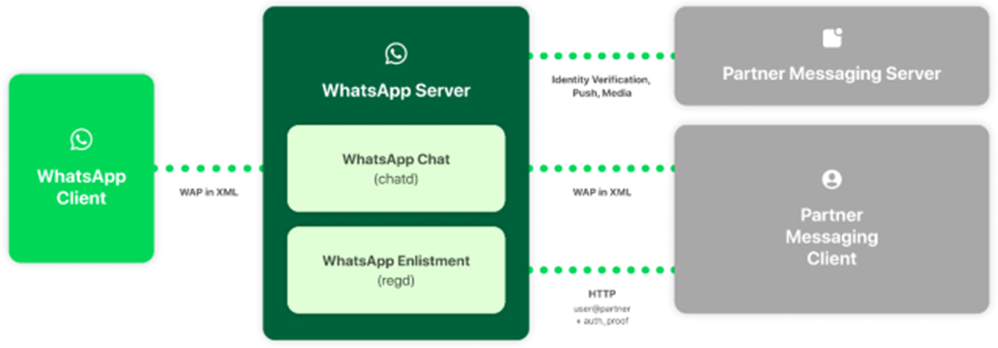Teacher
Professional
- Messages
- 2,669
- Reaction score
- 819
- Points
- 113
The company revealed the principles of encryption and indicated the terms of cooperation with third-party messengers.
On March 6, Meta announced details of the interaction of its messengers, WhatsApp and Messenger, with third-party services in accordance with the Digital Markets Act (DMA), a new law of the European Union.
The company stressed that the function of connecting to third-party chats (for example, a WhatsApp user's correspondence with a Telegram user directly) will be available to users with their consent, taking into account all possible risks of spam and fraud. It was also stated that third parties will have to sign an agreement, the details of which were not disclosed until today.
Meta pays particular attention to the use of the Signal Protocol for encryption, designating it as the preferred security standard. This protocol is already used in WhatsApp and Messenger to ensure the confidentiality of correspondence. Messenger continues to implement end-to-end encryption by default , while WhatsApp has been using it since 2016.
Meta described the technical aspects of implementing encryption, including creating Protobuf message structures (Protocol Buffers) and encrypting them using Signal, as well as delivering encrypted messages to Meta servers. The company also clarified that third parties will be responsible for hosting media files sent by their clients to Meta users.

The importance of the details disclosed by the company lies in the desire of users of Meta products to be confident in maintaining the security of their correspondence against the background of changes made by the DMA. Which, in fact, happened — security should not suffer.
However, Meta reserves the right to state that it cannot guarantee the security of third-party processing of messages, which can be used as an argument in favor of the exclusivity of using its own messaging services.
The company also pointed out the advantages of its solution based on the existing client / server architecture, which will allow new market participants to integrate more easily.
In addition, Meta noted that in the future, a different approach may be considered that does not require third parties to implement the WhatsApp client-server protocol, which will require additional agreements to protect Meta users from spam and fraud.
The company reminded that third parties will have to sign an agreement with Meta or WhatsApp before enabling the interaction option. The text of the WhatsApp agreement for third parties has already been published by the company, and a similar document for Messenger will be published in the near future.
On March 6, Meta announced details of the interaction of its messengers, WhatsApp and Messenger, with third-party services in accordance with the Digital Markets Act (DMA), a new law of the European Union.
The company stressed that the function of connecting to third-party chats (for example, a WhatsApp user's correspondence with a Telegram user directly) will be available to users with their consent, taking into account all possible risks of spam and fraud. It was also stated that third parties will have to sign an agreement, the details of which were not disclosed until today.
Meta pays particular attention to the use of the Signal Protocol for encryption, designating it as the preferred security standard. This protocol is already used in WhatsApp and Messenger to ensure the confidentiality of correspondence. Messenger continues to implement end-to-end encryption by default , while WhatsApp has been using it since 2016.
Meta described the technical aspects of implementing encryption, including creating Protobuf message structures (Protocol Buffers) and encrypting them using Signal, as well as delivering encrypted messages to Meta servers. The company also clarified that third parties will be responsible for hosting media files sent by their clients to Meta users.

The importance of the details disclosed by the company lies in the desire of users of Meta products to be confident in maintaining the security of their correspondence against the background of changes made by the DMA. Which, in fact, happened — security should not suffer.
However, Meta reserves the right to state that it cannot guarantee the security of third-party processing of messages, which can be used as an argument in favor of the exclusivity of using its own messaging services.
The company also pointed out the advantages of its solution based on the existing client / server architecture, which will allow new market participants to integrate more easily.
In addition, Meta noted that in the future, a different approach may be considered that does not require third parties to implement the WhatsApp client-server protocol, which will require additional agreements to protect Meta users from spam and fraud.
The company reminded that third parties will have to sign an agreement with Meta or WhatsApp before enabling the interaction option. The text of the WhatsApp agreement for third parties has already been published by the company, and a similar document for Messenger will be published in the near future.

